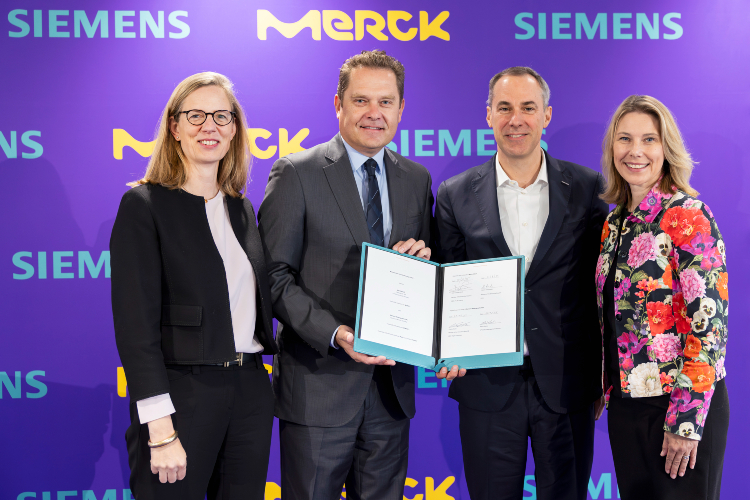Merck looks to digital to close discovery and biomanufacturing workflow gaps
Posted: 24 September 2025 | Dominic Tyer (European Pharmaceutical Review) | No comments yet
Extends its digital transformation partnership with Siemens to make greater use of automation, data and AI in its services.


Germany’s Merck has extended its partnership with Siemens to accelerate the digital transformation of the industry’s drug discovery, development and manufacturing capabilities.
The companies’ new agreement will see them harness automation, data and artificial intelligence (AI) in a bid to close existing workflow gaps in drug discovery and biomanufacturing.
Jean-Charles Wirth, Member of the Executive Board and CEO Life Science at Merck (pictured above, second from left), said: “Through this collaboration with Siemens, we are opening new possibilities for scientists to move faster from an idea in the lab to a therapy for patients.
“By combining our strengths, we aim to change how science advances, unlocking new ways to accelerate scientific progress.”
The firms’ updated partnership will focus on providing integrated software solutions, systems and consumables and it covers a range of joint projects, including developing AI-driven tools and digital interfaces to simplify scientific processes.
As part of that, Merck will apply Siemens’ Xcelerator Platform technology – bolstered earlier this year by Siemens’ acquisition of R&D software firm Dotmatics – as part of work to create end-to-end digital workflows from drug discovery to manufacturing.
Cedrik Neike, Member of the Managing Board at Siemens AG and CEO of Siemens Digital Industries (pictured above, second from right), said: “Every few years the cost for developing a new drug is doubling. Data, AI and digitalisation are key to break this paradigm. We are connecting every step of drug development through a digital backbone – so that data flows seamlessly, insights emerge faster, and medication reaches patients faster.”
The partners’ newly signed Memorandum of Understanding (MoU) will see Merck integrate its software-as-a-service (SaaS) products into Siemens’ digital ecosystem and, in time, co-develop new data management tools and interfaces. They will also evaluate options to launch digital marketplaces for technologies and services.
This work will add to earlier agreements between the pair, including building on their tie-up in smart manufacturing, or ‘Smartfacturing’ as they dubbed it last year when announcing a MoU to introduce elements such as a centralised governance structure and modular production.
Related topics
Digital, Drug Development, Drug Discovery, Drug Manufacturing, Research & Development (R&D)









